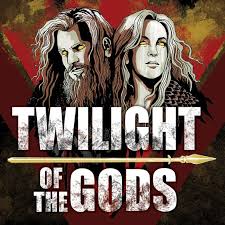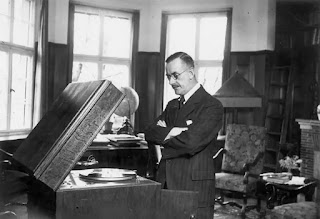 |
| Fantin-Latour |
In this, the inaugural piece of a multi-part series exploring Richard Wagner's profound influence on early 20th-century art and esoteric movements, Alistair Finch delves into the dawn of the 'moderns' and the composer's transformative impactRichard Wagner’s monumental Gesamtkunstwerk—his "total work of art" where music, drama, poetry, and spectacle coalesce into a singular, immersive experience—served as a potent conceptual blueprint for a nascent spirituality within the visual arts of the late 19th and early 20th centuries. Beyond mere aesthetic ambition, Wagner's pursuit of a unifying, transformative artistic experience resonated profoundly with the esoteric currents of his era, foreshadowing and directly influencing movements that sought to pierce the veil of material reality. His leitmotif system, for instance, functions with an almost Kabbalistic precision, imbuing thematic fragments with layers of symbolic resonance that transcend narrative literalism, hinting at a hidden architecture of meaning.
The very essence of Wagner’s mature works, particularly the Ring Cycle and Parsifal, posits art as a conduit for profound, often mythic, truth. This intrinsic drive towards transcendence found fertile ground in the burgeoning esoteric movements of his era and beyond. Foremost among these were:
Theosophy: Founded by Helena Blavatsky in the late 19th century, Theosophy proposed a universal spiritual wisdom underlying all religions, emphasising spiritual evolution, reincarnation, and the existence of invisible planes of reality. Its teachings, particularly on the concept of "Thought-Forms" (visual manifestations of emotions and ideas), provided a direct conceptual link for artists seeking to depict the unseen.
Anthroposophy: Developed by Rudolf Steiner, Anthroposophy branched from Theosophy, offering a detailed cosmology and a path for human spiritual development. It stressed the direct spiritual perception and the hidden meaning in forms and colours, guiding artists towards an understanding of the cosmos's underlying spiritual order.
 |
Jean Delville: Parsifal
|
These philosophies, which posited unseen dimensions and spiritual evolution, offered a compelling framework. The ambition to render "thought-forms" or visualize cosmic energies, as seen in early abstract art, finds a direct conceptual parallel in Wagner’s meticulous construction of mythic worlds through sound and symbol. His operas, like alchemical processes, aimed at a grand integration of disparate elements, echoing the esoteric quest for spiritual transformation and the unification of consciousness.
This profound interplay is vividly illustrated through artists who either directly engaged with Wagner’s oeuvre or were swept into the gravitational pull of his artistic philosophy:
Wagner's Gesamtkunstwerk as the Proto-Esoteric Blueprint
The very raison d'être of Wagner's mature works, particularly the Ring Cycle and Parsifal, moves beyond mere entertainment or even dramatic narrative. They are immersive, almost ritualistic, experiences designed to transport the audience into a realm of mythic archetype and profound psychological truth. This inherent desire for transcendence, for an art that reveals rather than merely represents, finds direct echoes in the burgeoning esoteric movements of his era and beyond:
 |
Gaston Bussière
|
Symbolism's Evocative Power: For Symbolists, who recoiled from the mundane literalism of Realism, Wagner was a revelation. His operas provided a template for an art that evoked, rather than depicted, the ineffable. The Symbolists, themselves deeply immersed in Hermeticism, Rosicrucianism, and Theosophy, recognised in Wagner's mythopoeic dramas the very quest for hidden meanings and archetypal resonance that animated their own work. His use of myth, allegory, and heightened emotional states was a direct parallel to their artistic intention to penetrate the veil of the material world. Fantin-Latour's dedicated lithographs, translating the emotional intensity and mythical grandeur of the
Ring,
Tannhäuser, or
Lohengrin into visual form, speak to this direct interpretive connection.
Jean Delville, a true esotericist and a central figure in the Symbolist Salons de la Rose+Croix, elevated Wagner's
Parsifal to the status of a spiritual paradigm, seeing in its narrative of redemption and initiation a profound alchemical journey of the soul. His visual interpretations of
Parsifal are not merely illustrations, but mystical exegeses.
Gaston Bussière (1862–1929), a French Symbolist painter, similarly embraced Wagnerian themes, with his painting
"Yseult" (c. 1900), embodying the tragic passion and ethereal beauty characteristic of Wagner's
Tristan und
Isolde.
Art Nouveau's Organic Unification: The organic forms and flowing lines of Art Nouveau, seeking to infuse every aspect of design with a vital, unifying aesthetic, found an implicit inspiration in the Gesamtkunstwerk. Just as Wagner sought to seamlessly integrate all artistic components into a cohesive whole, Art Nouveau architects and designers aimed for environments where every detail contributed to a singular, harmonious experience. This pursuit of organic unity, often expressed through natural motifs, can be seen as an intuitive understanding of the underlying cosmic interconnectedness that esoteric philosophies espouse. The aspiration for art to be an all-encompassing environment rather than isolated pieces aligns perfectly with Wagner's holistic vision.
 |
| Hilma af Klint |
Abstract Art's Spiritual Ascent: Perhaps the most profound connection lies with the pioneers of Abstract Art. Artists like Wassily Kandinsky, Piet Mondrian, and Hilma af Klint, deeply steeped in Theosophy and Anthroposophy, sought to transcend the material world entirely. They believed that true art should express inner spiritual realities, not outer appearances. This mirrors Wagner's drive to strip away superficial narrative to expose universal human passions and archetypal forces through pure musical and dramatic expression. Kandinsky’s treatise
Concerning the Spiritual in Art could almost be a manifesto for a visual
Gesamtkunstwerk, advocating for the spiritual vibration of colour and form, much as Wagner understood the spiritual resonance of specific chords and leitmotifs. Hilma af Klint's early abstract compositions, channelling messages from "Higher Masters," represent a direct, conscious attempt to visualise spiritual evolution, an ambition not dissimilar to the transformative arc within Wagner’s
Ring.
Surrealism's Subconscious Depths: While ostensibly rooted in Freudian psychoanalysis, Surrealism's fascination with dreams, the subconscious, automatism, and the irrational found deep parallels in esoteric exploration. André Breton's personal interest in alchemy speaks volumes, as the alchemical process—with its transformative stages and symbolic integration of opposites—offered a perfect analogue for the Surrealist desire to fuse dream and reality into a "surreality." Wagner's operas themselves delve into the profound psychological landscapes of their characters, bringing forth primal desires, archetypal fears, and the often irrational impulses that drive human destiny. The dreamlike, frequently disturbing, quality of a scene like Tristan's delirium or the Norns' weaving of fate could find a direct visual correlate in a Surrealist canvas, bridging the seen and unseen, the conscious and the profound, symbolic unconscious.
Direct Visual Intersections: The Wagnerites and Beyond.
Beyond these philosophical alignments, the phenomenon of the "Wagnerites" provided direct fodder for artistic representation, symbolising the transformative power of the Gesamtkunstwerk on its audience:
 |
Aubrey Beardsley: The Wagnerites
|
Aubrey Beardsley's "The Wagnerites": This singular, iconic drawing by Beardsley (himself a fervent devotee) perfectly captures the almost ecstatic, cult-like absorption of Wagner's audience. It's not merely a portrait of individuals but a visual commentary on the immersive, all-consuming nature of the Wagnerian experience, reflecting the very spiritual surrender that esoteric traditions often seek.
 |
Henri Fantin-Latour The Muse
|
Fantin-Latour's Reverent Illuminations: His lithographs, directly illustrating scenes from the operas, are a testament to the visceral impact Wagner's narratives had on the visual imagination. These works bridge the divide between music and visual art, translating the Wagnerian "tone painting" into a tangible pictorial form.
Leeke's Narrative Grandeur and Rackham's Mythic Resonance:
 |
| Ferdinand Leeke: The Walkures |
Ferdinand Leeke (1859–1923): This German painter (Ferdinand Richard Edward Leeke), trained at the Munich Academy, became widely recognised for his academic yet dramatic oil paintings depicting key scenes from Wagner’s operas. Commissioned by Siegfried Wagner, his works, often reproduced, presented a vivid and accessible visual lexicon for the mythological narratives of the "Ring Cycle," Parsifal, and others, emphasising their theatrical spectacle and heroic scale.
 |
Ferdinand Leeke: From Rheingold
|
Arthur Rackham (1867–1939): This eminent English illustrator (Arthur Rackham RWS), a leading figure of the "Golden Age" of British book illustration, profoundly shaped the visual imagination of Wagner's "Ring of the Nibelung" (published between 1910 and 1911). His distinctive style, characterised by gnarled forms, fantastical creatures, and an uncanny ability to imbue landscapes with an ancient, eerie magic, captured the primordial and elemental forces underpinning the Norse sagas, providing a visual resonance to the esoteric subtext of Wagner’s cosmic drama.
In essence, Wagner's Gesamtkunstwerk was more than a technical innovation; it was a profound spiritual undertaking. Its ambition to create an art form that transcended the material and engaged with the deepest layers of human experience and universal myth resonated deeply with the esoteric currents bubbling forth in the late 19th and early 20th centuries. For the Symbolists, Art Nouveau designers, Abstract pioneers, and even the Surrealists, Wagner provided not just inspiration but a powerful conceptual framework for an art that sought to reveal the hidden architecture of the cosmos and the transformative potential within the human soul. The "Wagnerites" themselves, portrayed by Beardsley, were not merely opera-goers but participants in a ritual of artistic transcendence, embodying the very aspiration shared by their contemporary esoteric artists.










.jpg)
















































